Check-Line DTW 100 Electronic Torque Wrench and DSD-4 Electronic Torque Screwdriver
The Check-Line DTW 100 is a super-nice electronic torque wrench.
It works well for motorcycle use, with a useful range and an audible “beep” when the correct torque is reached.
This could and should find a home in every motorcycle mechanic’s toolbox (although I store mine in the house!).
It does take a battery and the instruction manual could use some improvement however.
It is certified and tested to be correct and it comes with a test certificate.
But, as long as the manufacturer gives out exact fastener specifications, why not do your part and make sure the nuts and bolts are torqued correctly?
As for the DSD-4 torque screwdriver, it probably will land only in a select few homes, but I’ll tell you that it’s a real kick and I’m sorry that our loan period is over and it has to go back to Check-Line. (UPDATE: I liked it so much, I bought it!)
There are torque wrenches…and then there are torque wrenches.
The $19.99 Harbor Freight “torque wrench” (Yes, Virginia, there is a torque wrench for less than 20 bucks) is one of the former, and no — it will not find a home in my garage.
I wouldn’t torque the bolts on a wheelbarrow with the thing.
The Check-Line DTW 100 electronic torque wrench — aka “torque tester” — is one of the latter. This is as serious a tool as has ever graced the webBikeWorld garage and I want to put on a pair of white cotton gloves each time I remove it from its fitted case.
I mean let’s face it — so you just dropped 25 Big Ones for that MV Agusta F4-R 312. And you’re going to use which brand of wrench on the axle nut?? Right, I thought so…
A good torque wrench is going to set you back several hundred dollars, so let’s get that out of the way right up front and cheapskates beware.
And since we’re into electronics around here, mine has to have a readout, which gives it the ability to easily shift between Nm and Lbs. Ft. (mandatory when working on motorcycles).
I can’t/won’t tell you how many shekels have been blown already around here by mis-reading Lbs. Ft. for Nm).
It also should have a buzzer or click that lets me know when the correct torque value is reached, and electronic versions must turn of automatically after a reasonable time.
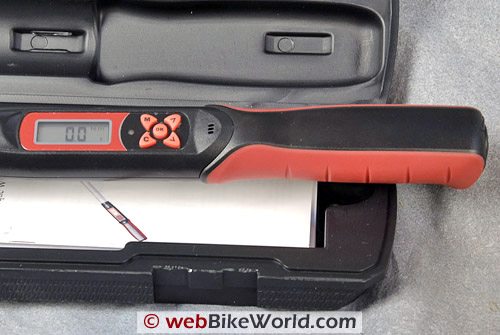
Where to Buy Torque Screwdriver
Check Reviews & Prices on AmazonSee More: Motorcycle Accessories, Motorcycle Tire, Motorcycle Helmets
The Check-Line DTW100 Electronic Torque Wrench
The Check-Line DTW 100 does all of that and more. The “100” means that this is the 10-100 Lb. ft., 1/2″ drive version.
It also displays 13.5 to 145 Nm and even 120 to 1200 Lb. In. It has both clockwise and counter-clockwise torque capability, which is interesting, and it also can store up to 50 data points for reference.
The DTW 100 uses two AA batteries, which have a claimed 110 hour life in continuous operation and 1 year in standby.
It has a claimed 10,000 cycle life expectancy (that’s a lot of nuts torqued).
It can survive a 1 meter drop and 10G vibration.
And it also has a very nice rubberized handle, which makes it a dream to use, and the entire device is a very impressive looking, high-quality instrument…uh, tool.
The instruction manual is well written and easily understandable, although like any instrument, it does take a bit of time to go through all the functions to learn what it can do.
There do seem to be a few minor discrepancies between the Owner’s Manual that came in the box and the specifications published on the Check-Line website, probably due to the various models that are available (1/4″, 3/8″ and 1/2″ drive in different configurations)
Also, because Check-Line distributes some of the tools that are globally sourced to their specifications.
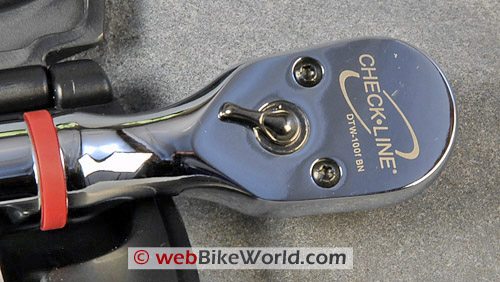
Certificate of Calibration
This one came with a signed-by-a-human Certificate of Calibration, indicating that it was almost perfectly accurate within the entire range and then some — it was tested at 7.00 Nm up to 135.00 Nm with a maximum error of only 0.92%.
The Certificate of Calibration says that 7.00 – 14.00 Nm is under the normal range, and it only has figures up to 135 Nm, but the website says the high end of the range ends at 145 Nm.
But that’s not a big deal to me.
The Certificate also shows the counter-clockwise calibration error, and the maximum error there is -0.22% for our unit. Pretty impressive!
The claimed error is ±2.5% clockwise and ±3.5% counter-clockwise, so we’re well within specs and about as accurate as you can get in a commercial torque wrench at this price.
The molded plastic case is robust very well made and it has a fitted compartment for the wrench and the batteries.
The two AA batteries are inserted into the end of the handle under a 1/4-turn screw top, and the space left in the case can be used to store an extra pair if needed.
And get this — the case even has a molded section for the Owner’s Manual and Certificate of Calibration! No more twisted and folded paperwork; it fits perfectly right where it belongs.
This is a hefty tool — it weighs in at 1196 grams (2 lbs., 10-1/8 oz.) on the webBikeWorld Polder scale; almost as much as a motorcycle helmet!
The head is nicely chrome plated and I can’t seem to keep myself from polishing it with a microfiber cloth after I use it. Sorry…
Check-Line is a tool fetishist’s dream; they have all sorts of interesting electronic torque wrenches, electronic torque testers, electronic force gauges and even ultrasonic wall thickness gauges.
And don’t forget my favorite — the electronic coating thickness gauges! Hey, you never know when you’re going to have to make sure that TiO2 coating on your Öhlins forks was evenly applied!
So if you’re as fanatical as I am about correct torque, which is so very important on motorcycle repair and maintenance, and you’re looking for a treat, check this one out.
The price for the DTW 100 is $199.00 as of this writing, which actually compares very favorably to some non-electronic torque wrenches I’ve seen recently. It carries a one-year warranty.
Check-Line electronic torque wrenches can be ordered directly online from the Check-Line website (see below for more information).
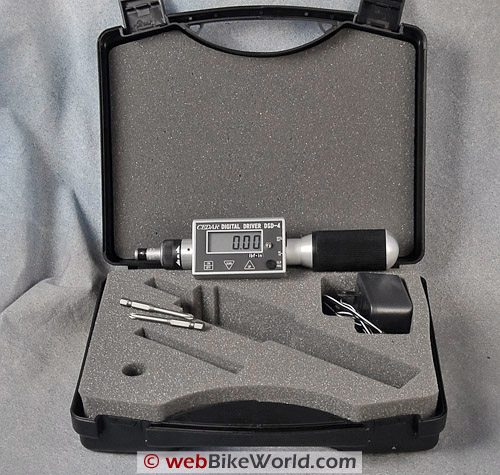
Where to Buy Torque Screwdriver
Check Reviews & Prices on AmazonSee More: Motorcycle Accessories, Motorcycle Tire, Motorcycle Helmets
The Check-Line DSD-4 Torque Screwdriver
(by “Mad Dog” Earle for webBikeWorld.com) – We purchased the DTW 100 electronic torque wrench shown above, but we also talked Check-Line into loaning us one of their interesting electronic torque screwdrivers just for a look-see.
I was aware that such a thing existed, but even a tool nut like me is sometimes too embarrassed to admit to a desire to torque the screws on the luggage rack of, say, my 1961 Heinkel Tourist scooter, for example?
If you don’t understand, I probably lost you a long time ago anyway. But true tool freaks will drool at the site of this device!
I’ll also admit that I have for some time wondered why screws don’t have their own torque specs.
Screws on motorcycles either seem to have as their female mates threaded holes made from your choice of plastic or aluminum.
Both of which, need I say, are notoriously fickle with their decisions to either accept the screw without complaint or start playing games with the screwee (veiled analogies to human marriage notwithstanding).
Anyone who has pointed the sharp end of a screwdriver at a motorcycle knows what I mean — one minute the screw goes in like buttah and then all of a sudden it’s as grabby as Grandma at Uncle Joe’s funeral.
Not to mention: have you ever wondered why motorcycle screws are programmed with a useful life of 4 ins-and-outs before they totally give up the ghost?
Take the screws that hold the Ducati GT1000’s tail light lens in place — please!
Screw one in 1/4 turn more than necessary and BAM! the threads in the plastic are stripped quicker than that dancer the other night at….(Editor’s Note: Ah, we won’t go there, this is a Family Friendly site!).
So if screwing in screws is such a screwy problem, how come there aren’t any torque specs for them?
I bet there are, but the conspiracy theorist in me says that the dealers don’t want us to know — think about all the money they make by selling us replacement plastic and aluminum bits!
Now you know why those Triumph Tiger fairing screws that cost $0.02 to make end up in your palms for $1.50.
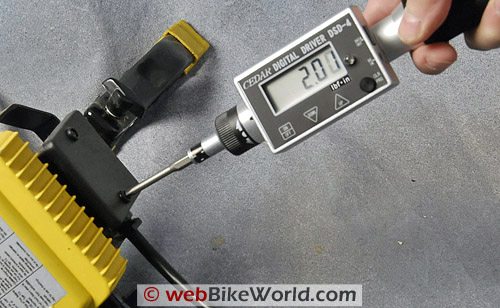
Details
OK, back to the electronic torque screwdriver, or “torque tester”, as it is sometimes referred to on the Check-Line website. This is another jewel, apparently made in Japan by a company calledImada and labeled for Check-Line.
No problem with that, considering the overall goodness of Japanese products (which, by the way, were once ubiquitous and are now are rarely seen on U.S. shelves).
The DSD-4 isn’t quite as jewel-like as the DTW 100 electronic torque wrench; it’s more business-like in its appearance, with a matte silver coating rather than chrome.
It feels pretty much like a ratcheting screwdriver would or should, with the exception of that big LCD display.
The tool weighs 335 grams (11-7/8 oz.), and it also comes in a very nice plastic molded box and it’s fitted into a bed of foam. It comes with two 1/4″ drive Phillips screwdriver bits, and any normal 1/4″ drive bits can be used.
The DSD-4 electronic torque screwdriver has a built-in NiCad battery, and it comes with a plug-in electric charger. Battery life is claimed to be 8 hours in continuous use, and it automatically turns itself off after 10 minutes of inactivity.
The DSD-4 model shown here is the basic electronic torque screwdriver, with a range of 0.3 – 35.0 lb. in. The list price is $595.00.
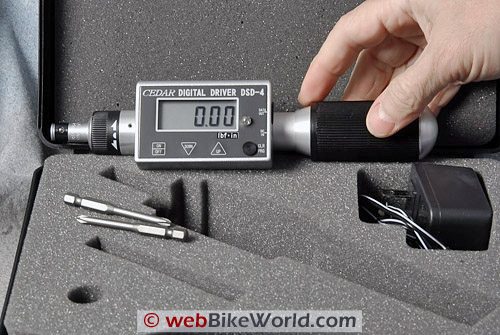
Where to Buy Torque Screwdriver
Check Reviews & Prices on AmazonSee More: Motorcycle Accessories, Motorcycle Tire, Motorcycle Helmets
Specifications
It’s interesting to note that even with its electronic brain, the DSD-4 does not convert to Nm.
Separate electronic torque screwdrivers are available in various ranges:
- DSD-4oz is 3.0 – 4.0 oz. in.
- DSD-4kg is 0.3 – 40.0 kg. cm.
- DSD-4cN is 3.0 – 400.0 N cm.
- DSD-4N, which would be the Nm equivalent of the model number DSD-4 lb. in., goes from 0.030 – 4.000 Nm.
Obviously (I hope), I’m being somewhat facetious here, because very few shade tree motorcycle mechanics keep an electronic torque screwdriver in their tool belt.
But webBikeWorld has always been about bringing you the interesting, unique and the hard-to-find, so I hope this expands your tool knowledge just a bit.
Accuracy and Traceability to NIST Standards
The DSD-4 also torques in both the clockwise and anti-clockwise directions.
It’s claimed to possess ±0.5% accuracy, and the Certificate of Compliance on this instrument is traceable directly back to our own National Institute of Standards and Technology (right here in Maryland).
NIST has a voluntary program that allows laboratories and industry to follow a series of guidelines for calibration that allow them to claim traceability right back to “the horse’s mouth”, so to speak.
Our DSD-4 traces back to 7 different standards for “Weights/Hangers” and one for “Temp/Humidity”.
And the results? It’s super-accurate: at maximum torque of 35.0 lb. in., ours actually measured 34.97 clockwise and 35.07 anti-clockwise (sorry, counter-clockwise), according to the certificate.
That’s about as dead-nuts accurate as you’ll ever find! It also reads 0.00 at 0.00, which is crucial; nothing like having an instrument that doesn’t start from zed!
The resolution on the DSD-4 displays in 0.01 lb. in. increments, and it’s interesting to note that I can twist it up to about 2.56 lb. in. by grabbing the screwdriver bit and twisting the handle. Above that, I lose my grip.
The DSD-4 electronic torque screwdriver has a variety of settings, some of which come in handy and others we’d probably never use on a motorcycle.
It can be set to display a high or low setpoint for a torque value.
Also, a “peak down minimum trigger point”, which allows the screwdriver to start the output of data points after it reaches a certain point (the DSD-4 has an RS232C output jack).
And a batch counter to store in memory the torque values of a set of inputs; a beeper, which can be set to go off at certain setpoints; an automatic zero reset, used after applying torque; and a timer.
Some of these are rather obscure to us but would be used in a production environment, where a user can torque a set of fasteners, record the data, output it and then get an alarm or statistics on which fasteners met the requirements.
For us, the fun part is going through the bike and seeing the torque values for the various screws and fasteners.
If you’re not a toolie and you’re still with us, congratulations, and let me tell the tool freaks out there that it is a wonderful feeling to know that literally every nut, bolt and now screw is torqued to exact specifications!
Just think how much smoother that MV Agusta will run with everything precisely buttoned down, and how much better you’ll feel knowing it!
Conclusion
The DTW 100 is a super-nice electronic torque wrench and should be in every home motorcycle mechanics toolbox (but I store mine in the house).
As long as the manufacturer gives out exact fastener specifications, why not do your part and make sure the nuts and bolts are torqued correctly?
The DSD-4 probably will land only in a select few homes, but I’ll tell you that it’s a real kick and I’m sorry that our loan period is over and it has to go back to Check-Line.
Also: All wBW Torque Wrench Reviews
|
wBW Review: Electronic Torque Wrench and Torque Screwdriver
|
|
|---|---|
| Manufacturer: Check-Line | List Price (2007): DTW-100f $495.00 (Street Price: $215.00). Screwdriver $595.00 |
| Sizes: Many sizes and capacities available. | Made In: Wrench – Taiwan. Screwdriver – Japan. |
| Review Date: November 2007 | |
Note: Item provided by a retailer, distributor or manufacturer with these Terms and Conditions.
Where to Buy Torque Screwdriver
Check Reviews & Prices on AmazonSee More: Motorcycle Accessories, Motorcycle Tire, Motorcycle Helmets
Owner Comments and Feedback
See details on submitting comments.

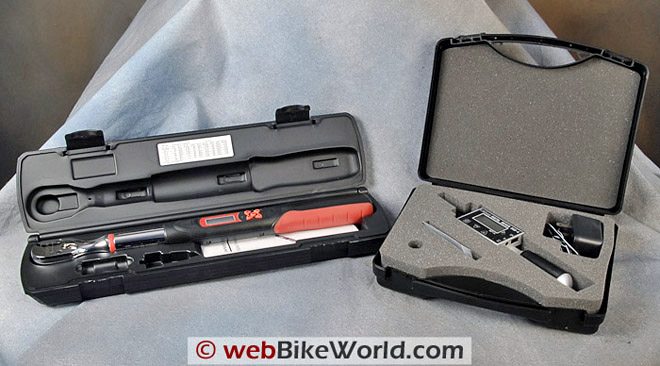

No Comment